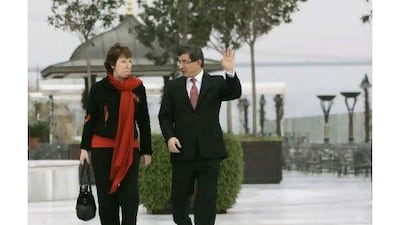ISTANBUL // In hosting a fresh round of international talks about Iran's controversial nuclear programme in Istanbul this week, Turkey is hoping for a boost to its aspirations to become a regional power broker.
Catherine Ashton, the EU foreign policy chief, held talks with Ahmet Davutoglu, the Turkish foreign minister, in Istanbul last Thursday to review the meeting, scheduled for tomorrow. Mr Davutoglu held separate talks with Said Celili, the Iranian negotiator, in Ankara.
Mr Davutoglu said after meeting Lady Ashton: "Another meeting two months after Geneva in itself shows that there is a constructive approach by both sides," referring to the last meeting on the nuclear issue, held in the Swiss city in December. "We hope that the Istanbul meeting will result in a continuation of the atmosphere of mutual trust-building and that more concrete results will be possible."
The West is concerned that Iran may want to build a nuclear bomb, a charge Tehran denies.
Officially, Turkey is downplaying its role in the talks between representatives of the five permanent members of the UN Security Council - China, France, Russia, the United Kingdom and the United States - plus Germany on one side and the Iranians on the other. "We will only be a facilitator by hosting the meeting", said a senior Turkish diplomat, "We will not take part in them."
Lady Ashton also said Turkey's role would be limited to that of a host. "The negotiations will be carried out by the team as it was before," she said.
But it was Turkey that suggested Istanbul as a venue for the Iran talks. Last year, the Turkish government waded into the controversy surrounding Tehran's nuclear programme by striking a deal with Brazil and Iran on sending Iranian uranium to Turkey in exchange for receiving higher-enriched uranium from abroad for use in a medical reactor. That deal was rejected by the West. Shortly afterwards, Ankara angered its Nato allies by voting against a fresh round of Iran sanctions in the UN Security Council.
Critics in the West have accused Turkey of playing Iran's advocate, especially after Recep Tayyip Erdogan, the prime minister, told The Guardian newspaper in 2009 that western criticism directed against Tehran's nuclear programme was "not very fair because those [who accuse Iran of pursuing nuclear weapons] have very strong nuclear infrastructures" themselves.
Turkish diplomats vehemently deny their country is turning away from the West. As a Nato member for more than half a century, Turkey has had a "long-standing orientation" towards the West, another Turkish diplomat said. "There is no conflict between that orientation and the vision to have good relations with neighbours."
Ankara does not want a nuclear-armed Iran, but is also anxious to avoid any military confrontation between the West and Tehran. Turkey concedes that "there are certain concerns" towards the Iranian programme, as the diplomat put it. But those concerns "should be eliminated to the satisfaction of all" parties involved. Turkey regards last year's uranium swap deal that was struck in Tehran as the best way forward and was "still on the table", the diplomat said.
In the run-up to the meeting in Istanbul, Mr Davutoglu and Turkish diplomats said their country was ready to help the process along by trying to create an atmosphere conducive for fruitful talks. "There may be bilateral talks with both sides," one diplomat said.
Under Mr Davutoglu, who became foreign minister in early 2009, Turkey has started to pursue a much more active foreign policy that is based on the idea of turning the country into a regional power centre by a strong economy, a solution to domestic problems and by conducting a "zero problems" approach towards all its neighbours.
Even a limited success of the talks in Istanbul would provide a boost to that ambitious agenda. But while Ankara is keen to keep up the momentum of improvement in its ties with Iran, that foreign policy priority has to be weighed against Turkey's other aims of becoming an honest broker in the nuclear row and of convincing the West it is not turning towards the East.
Before the meeting in Istanbul, Turkey has started to use subtle manoeuvres behind the scenes in order to make sure it can maintain that balance. In one example, Ankara has postponed the final decision about whether a four-day state visit by Abdullah Gul, the Turkish president, to Iran will go ahead as planned on February 14 to 17. Mr Gul would go to Iran only if the nuclear talks in Istanbul end with some progress, Turkish newspapers reported. That way, Turkey wanted to put pressure on Iran to show some flexibility at the Istanbul meeting, the reports said.

